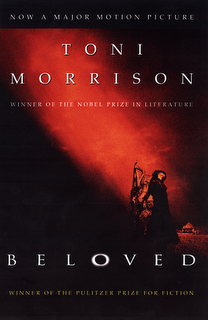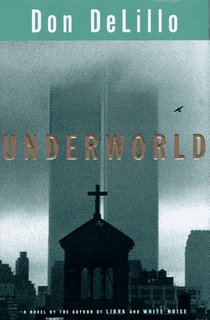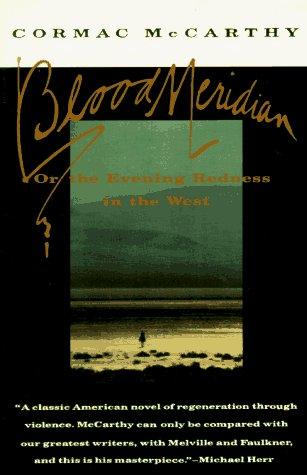What would you say is the best work of American fiction published in the last twenty-five years?
This is a question the New York Times thought they'd try to answer, and with a list of 125 writers and essayists and critics, they posed the question: what is the single best work of American fiction published in the last twenty-five years? Accompanied with a very readable essay about the survey and its results, they listed the twenty-or-so novels that came back with the most hits. But the top five collected more votes than all the rest:
Beloved, Toni Morrison
Underworld, Don DeLillo
Blood Meridian, Cormac McCarthy
Rabbit Angstrom: The Four Novels, John Updike
American Pastoral, Philip Roth
I would consider anything in the last twenty-five years to be "contemporary" literature, but I'm no literary scholar or critic. So, are these novels (and, by association those that qualify for the best American fiction of the last twenty-five years) contemporary literature? By "contemporary" I'm not referring to a style or mode of writing (although it can be argued that there is one to describe this tag), but rather a temporal association. I guess my definition of "contemporary" is fluid, changing as time changes, leaving behind what once was contemporary to bring new members to the team. Maybe my perspective on this will change one day. It's probably no surprise that Beloved is coronated with the title as the best work of American fiction from the last quarter century. It seems already so quintessential to American literature as a whole; it is thoroughly engrained in our minds as lit canon. As it should be.... it's a virtuoso whirlwind of weirdness and beauty and love and fear and all that other crap that I can't explain without reducing it to something that it's really not. That, and I think it's an important novel to read (something I can't say of the Updike/Roth group.... but more on that in a bit). I must admit that I find her writing sometimes to be super-dense, and I get thrown off the wagon too easily when she goes off on some tangent that I wasn't able to pick-axe into.... but I don't wane in my confidence of her writing. I remember once I was in a group of people talking about books (probably all with wine or Brooklyn beer in our hands), and everyone was talking about which author does this and which author does that, all of us dropping lit names here and there. I made some comment about how Morrison manages to do some strange ethereal stuff in her fiction that's so hard to do, and one of the people in the group looked at me blankly: "Morrison who?" they asked. Morrison who?! Has Toni Morrison not earned the right to be referred to by last name only, like we do all the greats like Faulkner, Fitzgerald, Joyce, Steinbeck, etc etc etc? Maybe it's because she's still living (but, we refer to Marquez as Marquez....), maybe it's because her work is still too fresh in our minds.... but if you don't know who Toni Morrison is, you've got some reading to do.
It's probably no surprise that Beloved is coronated with the title as the best work of American fiction from the last quarter century. It seems already so quintessential to American literature as a whole; it is thoroughly engrained in our minds as lit canon. As it should be.... it's a virtuoso whirlwind of weirdness and beauty and love and fear and all that other crap that I can't explain without reducing it to something that it's really not. That, and I think it's an important novel to read (something I can't say of the Updike/Roth group.... but more on that in a bit). I must admit that I find her writing sometimes to be super-dense, and I get thrown off the wagon too easily when she goes off on some tangent that I wasn't able to pick-axe into.... but I don't wane in my confidence of her writing. I remember once I was in a group of people talking about books (probably all with wine or Brooklyn beer in our hands), and everyone was talking about which author does this and which author does that, all of us dropping lit names here and there. I made some comment about how Morrison manages to do some strange ethereal stuff in her fiction that's so hard to do, and one of the people in the group looked at me blankly: "Morrison who?" they asked. Morrison who?! Has Toni Morrison not earned the right to be referred to by last name only, like we do all the greats like Faulkner, Fitzgerald, Joyce, Steinbeck, etc etc etc? Maybe it's because she's still living (but, we refer to Marquez as Marquez....), maybe it's because her work is still too fresh in our minds.... but if you don't know who Toni Morrison is, you've got some reading to do. I've always wanted to read Underworld, but have been scared off too easily because it's so damn massive. Let's keep in mind that I'm in no way a fast reader; Underworld will literally take me a month or two (conservatively) to read. White Noise is perhaps my favorite novel (and probably would be my pick for the best-in-the-last-25-years list), so I know DeLillo's got the chops.... but a 900 page book is quite a commitment. I thought once that I'd try to tackle David Foster Wallace's much-beloved (no pun intended) Infinite Jest, clocking in at well above 1200 pages or so (right?), but couldn't manage to crack the first fifty.... I think that book might be a casualty betraying the maxim "less is more". I've heard that Underworld is fantastic novel, but it's the kind of book you need to duct tape to your hand in order to really get into it. Somehow that reminds me of the mythic "Edward 40-Hands" college parties, were people duct tape 40s of beer to their hands and can't do anything until they're finished. Ah, college parties. Chances are they'd be less wild if people were duct taping books to their hands instead.
I've always wanted to read Underworld, but have been scared off too easily because it's so damn massive. Let's keep in mind that I'm in no way a fast reader; Underworld will literally take me a month or two (conservatively) to read. White Noise is perhaps my favorite novel (and probably would be my pick for the best-in-the-last-25-years list), so I know DeLillo's got the chops.... but a 900 page book is quite a commitment. I thought once that I'd try to tackle David Foster Wallace's much-beloved (no pun intended) Infinite Jest, clocking in at well above 1200 pages or so (right?), but couldn't manage to crack the first fifty.... I think that book might be a casualty betraying the maxim "less is more". I've heard that Underworld is fantastic novel, but it's the kind of book you need to duct tape to your hand in order to really get into it. Somehow that reminds me of the mythic "Edward 40-Hands" college parties, were people duct tape 40s of beer to their hands and can't do anything until they're finished. Ah, college parties. Chances are they'd be less wild if people were duct taping books to their hands instead. Blood Meridian is near the top of my little summer reading list, and I've always had strong interest in reading it but haven't gotten around to it yet. I must admit that I want to get to the gruesome parts (as mentioned by most people if the topic ventures to Blood Meridian), but because I've heard nothing but praise for it, it's next on my list. I first learned about Cormac McCarthy's work in a writing workshop I took a few years ago; during a class discussion, the woman sitting next to me spat acid on the work of Charles Frazier (author of Cold Mountain, a book I have not read, although the movie that is based from was not as good as I wanted it to be).... she said that Frazier blatantly ripped off McCarthy's work, and that McCarthy is not as well-praised as he should be. But.... look who's work has stood the test of time the best. Frazier's just gonna have to be happy with that National Book Award of his.
Blood Meridian is near the top of my little summer reading list, and I've always had strong interest in reading it but haven't gotten around to it yet. I must admit that I want to get to the gruesome parts (as mentioned by most people if the topic ventures to Blood Meridian), but because I've heard nothing but praise for it, it's next on my list. I first learned about Cormac McCarthy's work in a writing workshop I took a few years ago; during a class discussion, the woman sitting next to me spat acid on the work of Charles Frazier (author of Cold Mountain, a book I have not read, although the movie that is based from was not as good as I wanted it to be).... she said that Frazier blatantly ripped off McCarthy's work, and that McCarthy is not as well-praised as he should be. But.... look who's work has stood the test of time the best. Frazier's just gonna have to be happy with that National Book Award of his.
So, am I the only one who is not so in love with John Updike or Philip Roth? I find their works to be bloated and sometimes dripping with self-importance, as if they knew while they were writing that their works would be held as top achievements and would grace lists like this one. I think that's the largest strike against them in my opinion.... the stories that they tell are just fine and worth telling, so these guys are not being heralded for no good reason. That said, I don't like reading works where the author holds himself at a higher standard than his reader (sorry Nabokov and Pynchon, I think you guys are in this category too); it seems like they're trying to one-up the reader or establish a barrier of knowledge and worthiness, setting themselves at a higher standard than the audience that they're trying to attract.
The list has quite a few excellent selections (namely short story collections like Jesus' Son by Denis Johnson and The Things They Carried by Tim O'Brien), and a strange affinity for all things Philip Roth. It seems where Roth's never-ending stream of navel-gazing novels ring a bell with the group of 125, Joyce Carol Oates' poisonous proliferation has shot herself in the foot. I'm not going to make any statements about "how dare they leave off this!" or "how can they trust that!" because this list is in no way trying to pretend that it's not subjective. It just seems to be an interesting cross section of American literary minds and what they deem as important literature today. Chances are the list would look quite different if asked five years from now, or even five years past. Read the essay.... see what you think.
Friday, May 12, 2006
the best of contemporary american literature
pondered by
is that so wrong?
at
1:52 PM
![]()
Subscribe to:
Post Comments (Atom)

2 comments:
I do take exception with the NY Times to the fact that crime and its subgenres, noir and mystery, were not represented at all in both the panel and the list.
"Underworld" was a crucial book in my life as it helped me get over the hump in terms of screenwriting. DeLillo's vivid description of Cheevy sneaking into the game inspired my first complete screenplay and for that I am eternally grateful.
I never did get past the hundreds of pages waste and toxic waste management, and ettiquette dictated that I had to return the borrowed copy. I would like to finish it, but it's been almost seven years and I would have to reread most, if not all of the novel.
I agree with you about Roth, to some extent. While I have not read American Pastoral, I did trod through his recent one The Plot Against America and was only marginally impressed. It was an interesting premise, and I guess he did alright, but it did not capture me as some of the other books I have ravaged recently. So, a decent writer, but not astronomically brilliant.
(By the way, finished Cloud Atlas. Loved it! Just picked up Ghostwritten from City Lights, and will begin that one soon as I finish this one about trekking in Tibet's sacret valleys.)
Post a Comment